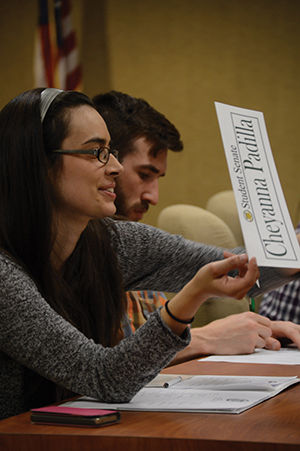Student Senate finds its rhythm

Cheyanna Padilla volunteers to assist with the painting of campus crosswalks on Saturday afternoon at the weekly Senate meeting on Wednesday, April 15.
After consecutive weeks with a change of venue and a residence hall forum, Student Senate worked its way back into a normal routine on Wednesday to host the second-to-last meeting of the semester.
Main topics of the meeting included the replacement of several trash cans around campus, upcoming senator elections for the fall term and three appropriation requests from registered student organizations.
Because of the impending smoking ban that will swing into effect in the fall semester, Vice President Brooklyn Lampe gave a presentation on why Southern needed to update the trash cans all across campus, as well as the potential costs of the change.
“We need to work on updating the trash cans not only because they are outdated, but also because we don’t want to set a double standard by having trash cans with ashtrays in front of the buildings,” said Lampe.
Lampe’s plan included the addition of 30 trashcans on campus, which came to a total cost of $11,549.75, with shipping included. The trash cans would be made of a durable metal and should maintain their look.
“The powder coated steel frame will prevent any rusting that would ever happen,” said Senator Danielle Campbell. “It will be nice to purchase something that we won’t have to replace a couple of years down the road.”
Senate will discuss the trash cans further in next week’s meeting.
In committee meetings, the finance committee was presented with three appropriation requests — the first from Southern Clay, a ceramics club.
Sarah Volkl, who presented on behalf of Southern Clay, addressed the finance committee.
“We will be attending an international program that is held in North Carolina where we would be able to meet a number of important people in our field,” said Volkl. “Only 42 people were accepted in all and two of us are from Southern.”
The cost of the program is significant, according to Volkl, totaling about $4,000 per student.
The other two appropriation requests came from Biology Club and Caduceus Club, who are taking a joint trip to Kansas City to tour area medical schools. Thirty-two students in all will be attending the two-day trip.
Your donation will support the student journalists of Missouri Southern State University. Your contribution will allow us to purchase equipment and cover our annual website hosting costs.



























